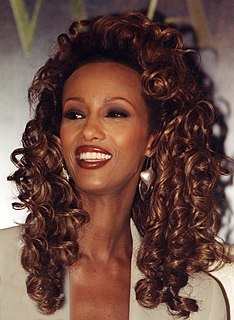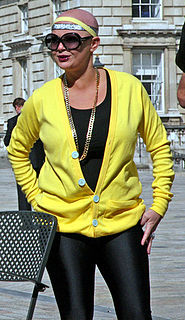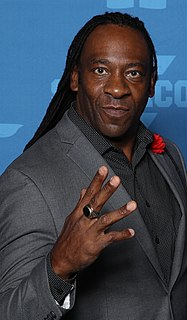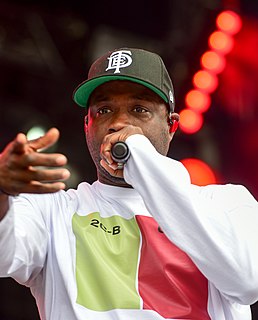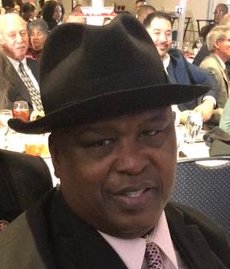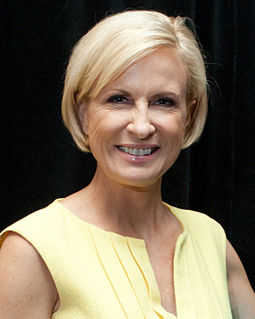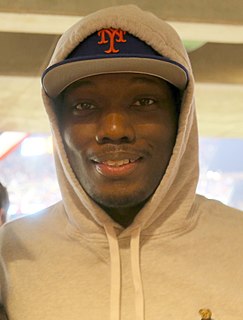A Quote by David C. Driskell
My sister was like my surrogate mother here, in Washington, with very much of the same persuasions as my mother. Even when friends came from home that I knew were more socially adaptable to the mores of the time, she would always caution me and say, "Be careful if you're going out with so and so because you know such and such a thing could happen." It was that kind of guardianship, and concern that imprinted me.
Related Quotes
...fact was she knew more about them than she knew about herself, having never had the map to discover what she was like. Could she sing? (Was it nice to hear when she did?) Was she pretty? Was she a good friend? Could she have been a loving mother? A faithful wife? Have I got a sister and does she favor me? If my mother knew me would she like me? (140)
I always say that comedians and actors were all kind of shy when they were young. I was very, believe it or not, kind of embarrassed as a child. But my mother was a very strong lady and she was the one that kept it going when I thought it would be over for me as a performer. She was always my inspiration and she was a big influence on me.
My mother always helped me because she was kind of a research fanatic. When she would write a screenplay, there would be so much research all over the walls. And so when I started working as an actress, I would do the same thing. She instilled in me a love of taking everything very seriously. It didn't matter what it was.
One thing my mother always instilled in me is to always know my worth. Don't settle for less. She used to say to me 'Iman, no is a complete sentence, learn to say no. You don't have to explain it you don't have to say anything after it. It's a complete sentence.' So when I came to America 1975, I found out that the black models were being paid less than white models. So the first thing I did was say I'm not going to do the job unless I'm paid the same amount.
A lot of people say that Eleanor Roosevelt wasn't a good mother. And there are two pieces to that story. One is, when they were very young, she was not a good mother. She was an unhappy mother. She was an unhappy wife. She had never known what it was to be a good mother. She didn't have a good mother of her own. And so there's a kind of parenting that doesn't happen.
My mother was wonderfully out about her dementia. She would sort of - she would say to me, I came out to the window cleaner about having dementia. You know, I love the way that verb for coming out of the closet has now become so socially useful for all sorts of situations, like when you need to explain to the window cleaner that you don't know if you paid him or not.
If I were hanged on the highest hill, Mother o’ mine, O mother o’ mine! I know whose love would follow me still, Mother o’ mine, O mother o’ mine! If I were drowned in the deepest sea, Mother o’ mine, O mother o’ mine! I know whose tears would come down to me, Mother o’ mine, O mother o’ mine! If I were damned of body and soul, I know whose prayers would make me whole, Mother o’ mine, O mother o’ mine!
My mother was superb. Even when I said to her, when I was nineteen, oh, I'm going to India. Her immediate reaction was, oh yes dear, and when are you leaving? She didn't say, oh how could you leave me, your mother? Or wait a bit dear until you get a bit older and you know your own mind. She just said, well, when are you going? And that was because she loved me, not because she didn't love me.
My mother ran the household. In grade school, I came home crying one day. She said, 'What's wrong?' and I said, 'This kid said he was going to jump on me.' She grabbed me and slammed me on the floor. 'If you don't go out there and stand up for yourself, it's going to be me and you.' I didn't want that to happen.
I remember it made me feel better because so many of my friends at school. Were doing that stuff and doing that stuff on sleep overs. But I just didn't feel ready. It wasn't like I had any judgment of it being two women. It would have scared me as much if not more. I was like a three month period in which all the words sleep over was code for was "let's get together and touch each other's vaginas." and I was. Haunted. And I remember going home and feeling like I couldn't tell my mother even though she would've understood and probably laughed.
It's true - my mother kicked me out the house at 14. I had to go live with my sister. I had some problems. I was very rebellious as a kid. I don't even know why or where it came from, but I had a lot of anger. Me and my mom clashed a lot because she didn't tolerate that, as she shouldn't from a 14-year-old.




